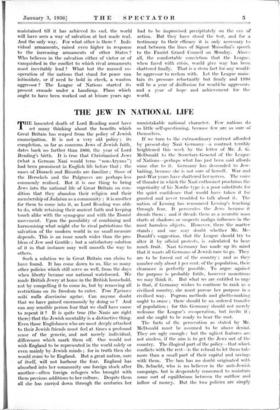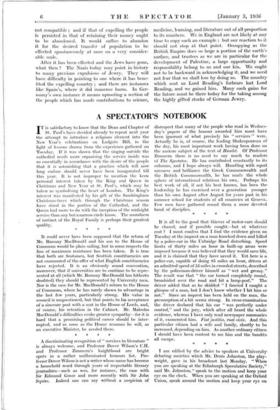THE JEW IN NATIONAL LIFE
111HE lamented .death of Lord Reading must have - set many thinking about the benefits which Great Britain has reaped from the policy of Jewish emancipation. It is not a very old policy ; its completion, so far as concerns Jews of Jewish faith, dates back -no -farther than 1860, the year of Lord Reading's birth. It is true that Christianised Jews (what a German Nazi would term "non-Aryans ") had been prominent in English life before that ; the 'cases of Disraeli and Ricardo are familiar ; those of the Herschels and the Palgraves are perhaps less commonly realised. But it is one thing to bring Jews into the national life of Great Britain on con- dition that they abandon their religion and their membership of Judaism as a community ; it is another for them to come into it, as Lord Reading was able to do, while retaining their ancient faith and keeping touch alike with the synagogue and with the Zionist movement. Upon the possibility of combining and harmonising what might else be rival patriotisms the salvation of the modern world in no small measure depends. This is an issue much wider than the pro- blem of Jew and Gentile ; but a satisfactory solution of it in that instance may well smooth the way to Others.
Such a solution we in Great Britain can claim to have found. It has come down to us, like so many other policies which still serve us well, from the days when liberty' became our national watchword. We made British Jewry at home in the British household, not by compelling it to come in, but by removing all restrictions on its freedom to enter. Tros Tyriusve nahi nulls discrimine agetur. Can anyone doubt that we have gained enormously by doing so ? And can any sensible peon fear that We shall have cause to repent it ? It is quite true (the Nazis are right there) that the Jewish mentality is a distinetive thing. Even those Englishmen who are most deeply attached to their Jewish friends Must feel at times a profound sense of the generic, and not merely individual, differences which mark them off. One would not wish England to be represented in the world solely or even mainly by Jewish minds ; for in truth then she would cease to be England. But a great nation, sure of itself, will not harbour the fear. England has absorbed into her community one foreign stock after another—often foreign refugees who brought with them precious additions to her culture. Despite them all she has carried down through the centuries her unmistakable national character. Few nations do so little self-questioning, because few arc so sure of themselves.
If we turn to the extraordinary contrast afforded by present-day Nazi Germany—a contrast terribly heightened this week by the letter of Mr. J. G. McDonald to the Secretary-General of the League of Nations—perhaps what has just been said affords some clue to it. Germany has descended to Jew- baiting, because she is not sure of herself. War and post-War years have shattered her nerves. The voice of thunder in which the Nazi enthusiast proclaims the superiority of his Nordic type is a poor substitute for the quiet confidence that would have taken it for granted and never troubled to talk about it. The nation of Lessing has renounced Lessing's teaching through fear. It persecutes the Jews because it dreads them ; and it dreads them as a neurotic man starts at shadows or suspects malign influence in the most harmless objects. However, there the matter stands ; and one may doubt whether Mr. Mc- Donald's suggestion, that the League should try to alter it by official protests, is calculated to bear much fruit. Nazi Germany has made up its mind that it wants all Germans of Jewish race to go. They are to be forced out of the country ; and as they number only about 1 per cent. of the population, their clearance is perfectly possible. To argue against the purpose is probably futile, however monstrous we may think it. But what we are entitled to urge is that, if Germany wishes to continue to rank as a civilised country, she must pursue her purpose in a civilised way. Pogrom methods and ghetto-making ought to cease ; there should be an ordered transfer of population ; for this Germany should not merely welcome the League's co-operation, but invite it; and she ought to be ready to bear the cost.
The facts of the persecution as stated by Mr. McDonald must be assumed to be above denial. They are ugly enough ; but the ugliest features are not aimless, if the aim is to get the Jews out of the country. The illogical part of the policy—that which conflicts with the rest—is the refusal to let them take more than a small part of their capital and savings with them. The ban has no doubt originated with Dr. Schacht, who is no believer in the anti-Jewish campaign, but is desperately concerned to maintain some sort of equilibrium between the outflow and inflow of money. But the two policies are simply not compatible ; and if that of expelling the people is persisted in that of retaining their money ought to be abandoned. It would suffice to abandon it for the desired transfer of population to be effected spontaneously at once on a very consider- able scale.
After it has been effected and the Jews have gone, what then ? The Nazis today may point in history to many previous expulsions of Jewry. They will have difficulty in pointing to one where it has bene- fited the expelling country ; and there are instances like Spain's, where it did immense harm. In Ger- many's own instance it means uprooting a section of the people which has made contributions to science, medicine, learning, and literature out of all proportion to its numbers. We in England are not likely at any time to copy such an example ; but our reaction to it should not stop at that point. Occupying as the British Empire does so large a portion of the earth's surface, and trustees as we are in particular for the development of Palestine, a large opportunity and responsibility belong to us and our kin. We ought not to be backward in acknowledging it, and we need not fear that we shall lose by doing so. The country which sent us Lord Reading's forbears lost Lord Reading, and we gained him. Many such gains for the future must be there today for the taking among the highly gifted stocks of German Jewry.











































 Previous page
Previous page